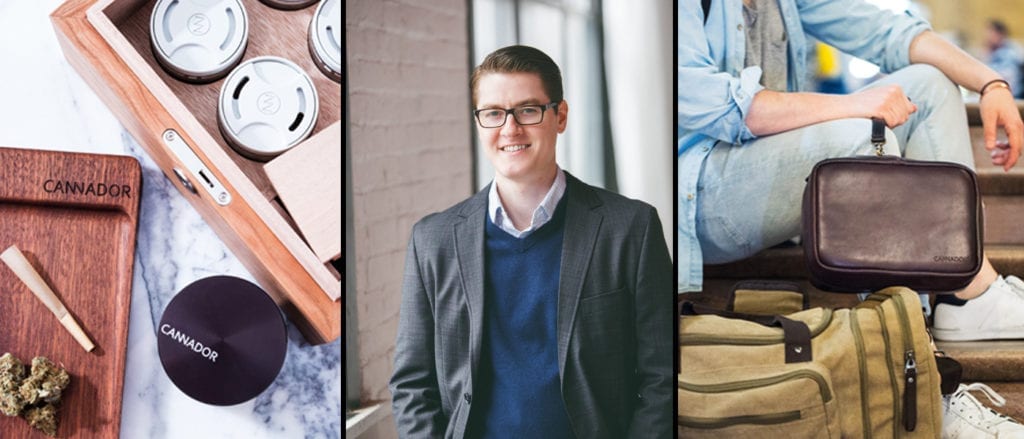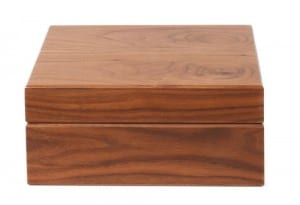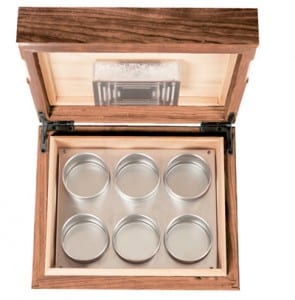Our first official interview candidate is Zane Witzel, CEO and founder of Cannador®, a brand of luxury stash boxes that are specifically designed to prolong the life of cannabis flowers by maintaining constant humidity. Like a humidor for luxury cigars, Cannador was built for the seasoned connoisseur, and it definitely looks the part.
Combining precise functional design with a luxurious aesthetic, it is truly a unique product. We had the opportunity to connect with Zane and ask him some questions about his experiences so far in the cannabis industry: read our interview below!
Ganjapreneur: When/where did you come up with the idea for the Cannador?
Zane Witzel: About a year ago, at a friend’s place in LA, I noticed an odd-looking shoe box sitting atop his dresser, loosely filled with jars, rolling papers, and just about every smoker’s accessory you can think of. I thought that was a great idea, a place where you can keep everything centrally located, but aside from the cute ‘toy box’ appeal, it was clearly lacking any kind of organization. Don’t get me wrong, everyone’s stash box is unique and special to them, but after considering that the non-DIY group might also want something like this, then there must be something out there that’s better than my friends shoe box. After doing some research, I couldn’t find anything that addressed the central problem of evaporative loss (aka dry bud) in addition to organizing and separating strains, so after learning that a certain ratio of moisture is optimal to keep bud fresh and flavorful, I adapted a few attributes of a humidor to cater to bud. But this story won’t end here, I believe there’s room to innovate the curing and storage market on a much grander scale for both industrial and consumer use, something I will continue to research alongside the help of a lab I’ve engaged.
Do you think that the storage and preservation of cannabis for industrial and commercial purposes will eventually be regulated by the government?
Possibly in new states that want to restrict cannabis consumption to medical use only, although I doubt this will happen in the near term. There haven’t been enough studies on cannabis storage methods, so it’s difficult for dispensaries to make educated decisions on what they should be using to maintain their inventory. Many dispensaries use plastic bins or mason jars simply because they’re moving inventory so quickly that THC stability really doesn’t matter to them. However, if and when they are forced to purchase excess inventory due to harvesting cycles and fluctuations in demand, these methods could be problematic since THC degrades from oxidation and evaporative loss. While the potency levels may seem negligible to the average recreational consumer, we have to keep in mind that it’s still a drug, and as such, it should be properly stored, just like any drug at a hospital.
What has been the greatest challenge you have faced bringing Cannador to market?
Other than telling my family at the Thanksgiving dinner table that I’m leaving my job in finance for this harebrained idea, there really is no greater challenge that I’ve faced than advertising. The primary channels available for advertising all forbid even the slightest hint that your product or service is related to marijuana. So we’re left with few options that don’t necessarily reach the right audience. At some point in our careers, we’ve all had to resort to guerrilla marketing tactics, but in this industry, it’s the norm.
How has the Cannador been received by the public?
It’s been well received since launching in June. I knew I did something right when nearly a quarter of our first customers became repeat customers. I guess I shouldn’t be too surprised that many are asking for larger storage units. Ask, and you shall receive. Plenty more sizes in the works.
Can you tell us about any of these new products?
I’m about to roll out a cabinet Cannador that will have several drawers and a pull-out work table. It will also have a shelf to store your glass. Think of it as a modified version of the classic 60’s cocktail bar. I’m also introducing alternate sized Cannadors as well as a stackable metallic canister that will have a kief repository and space for the Humidity Bead System® at the upcoming Hempfest and HempCon in August.
Have you had any celebrity customers or endorsements?
Not yet, although I’ve reached out to a few. I’d love to create a Strain Hunter’s line and get their input, those guys rock. I’m also pretty sure that celebrities like Tommy Chong or Snoop Dogg would appreciate our upcoming line of cabinet products that will be able to hold nearly a pound.
How long have you been following the cannabis industry in one way or another?
I started watching this industry really take off 2-3 years ago when Medbox, which operated right down the street from me on Sunset Blvd., began heavily marketing their dispensary systems. It became obvious that big players could enter and innovate. There’s still a lot more room for competition because this market is very immature, so it excites me to see new companies fill the many voids that piece together this emerging marketplace.
Did you begin your company with venture capital, crowd-funding, or did you fund it yourself?
Self-funded in addition to a small family loan.
Do you have employees? If so, how many?
No, it’s just me so far, wearing all the hats.
On your website, there is a page for your Corporate Social Responsibility statement: can you go into some detail about that?
Mainly inspired by Patagonia founder, Yvon Chouinard, I agree that we as a society should be more conscious about the actions we take. I’ve pledged to plant a tree for every unit purchased through a non-profit in Colorado to help reforest and replenish what we take. Like Patagonia, if I can follow the triple bottom line ethos, “People, Planet, and Profits,” then maybe it will continue to catch on and help make our world a better place.
Based on your experience so far, how do you see the cannabis industry evolving over the next few years?
These past few years have been about laying the foundation; banking, regulation and cultivation, so I think the next few years will be classified as the growth stage (primarily for companies in Colorado and Washington). Many of those businesses who got in early will now focus on perfecting their model and responding to market conditions. However, those companies in states where marijuana is either unregulated or just decriminalized will continue to face a litany of challenges. Out of this, we will probably see innovations in concentrates, new formulas and variations of extracts. We’ll also see the volume of cannabis increase, possibly even double, after more processing licenses are granted and the knowledge and skills behind cultivation improve. This would inevitably lead to cheaper prices, but if the government follows the same path they took with tobacco, we can rest assured the prices will be inflated.
Do you think the industry could be in danger if there is a change of power in Congress and/or the White House?
Like a fast moving train, this industry has too much momentum to slow it down. We’ve already proved that cannabis provides an economic and medical benefit to our nation’s health, so if there’s any resistance from Congress, it will be over regulation, but not any kind of reversal. Many in office are simply waiting for cannabis legalization approval ratings to increase so they can maintain their positions in office without rocking the boat. Governors Cuomo and Christie are both great examples of this. They’ve both repeatedly stated their disapproval of marijuana, yet both New York and New Jersey have enacted medical marijuana programs. Despite their respective states’ restrictions on which diseases are appropriate for the consumption of cannabis, scientific evidence will continue to render these laws obsolete and injurious.
What advice can you offer to aspiring ganjapreneurs?
Don’t let the stereotype of a typical marijuana enthusiast determine your customer base, and do not underestimate the business acumen of established ganjapreneurs. The number of cannabis-related businesses that are staffed with seasoned executives from major corporations may even surprise you. With regard to my first point, “the stoner” isn’t just a crystal-gripping hippie wearing tie-dye while listening to Phish. Yes, many of these people still wave that flag proudly, but this is no longer an accurate representation of the entire market. As cannabis consumption becomes more mainstream, there will be vast customer segments within age-groups and economic classes, just as there are in the apparel, auto, and consumer-electronics industries. Their appreciation for marijuana is just the tip of the iceberg, so just as you would in any business, get to know your customer!
Thank you, Zane, for taking the time to answer our questions about your experience running a business in the cannabis industry! We are looking forward to seeing those new products roll out in the near future, and we hope to check in on your progress down the road.
If you have follow-up questions of your own for Zane, you can write them in the comments area below or use the contact form via the Cannador website!
End



